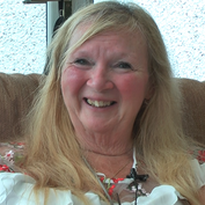Margaret Ann

Margaret Ann is part of a birth cohort study. She continues to receive questionnaires about this study. She questions why others would not take part in similar studies.
Margaret Ann is married and has two children. She is a retired pub landlady. Her ethnic background is White Scottish/British.
More about me...
Margaret Ann is part of a birth cohort study. She remembers her mother mentioning the study but thought that she was being recruited because of her weight. She now thinks she was randomly selected to the study. Her childhood was dominated by doctors’ visits and being bullied so she does not remember taking any tests at school as part of the study. However, she and her husband, who was part of the same cohort study, have had two questionnaires to complete over the years which had questions about the activities they took part in outside the home, what they read and what television programmes they watched. In the 1990’s, she remembers someone from the study came to her home and took her height and weight measurements and asked her questions about her health and diet.
Margaret Ann continues to participate in the study because she is interested in the differences between her and her grandchildren’s generational experiences. She finds it interesting how her generation had a greater sense of community and believes that her generation had a greater work ethic than today’s generations, which she thinks may be of interest to researchers. She is happy to complete questionnaires if her participation will help inform the education and lifestyle of future generations.
As Margaret Ann has been part of a birth cohort study, she has been invited onto other medical research projects. Her initial reaction when being invited was positive as she believes that her participation may help other people, particularly younger generations. This positive attitude towards research has also led her to take part in other projects, most recently one about people with weight issues.
Margaret Ann’s message to those who have been invited to take part in medical research is, “why would you not do it?” She believes that research involvement is the way to make a difference and, in relation to the cohort study, she believes that it is a way for others to understand her generation and what they went through.
Interview conducted in 2019.
Margaret Ann has been taking part in a birth cohort study for decades. She is happy to keep contributing to the study.
Margaret Ann has been taking part in a birth cohort study for decades. She is happy to keep contributing to the study.
Now what I would like is to the motivation from you; why do you keep participating in the study after thirty years or so?
Oh, it’s a long, long time. As I say, I think our lifestyle in the ‘50s was, you just can’t compare it to now because my life from the ‘50s is totally different and the changes over the years, my grandchildren would never understand. So, if someone, somewhere down the line thinks this is interesting, well I’m quite happy to answer the questions.
Margaret Ann is part of a birth cohort study. When she was an adult, she once had a visit from a research nurse who took some measurements. The research nurse explained some topics of interest in the study, like diet.
Margaret Ann is part of a birth cohort study. When she was an adult, she once had a visit from a research nurse who took some measurements. The research nurse explained some topics of interest in the study, like diet.
Have they explained to you on in a letter or when this lady came to take the measurements?
She just says, “Oh we’re just, it’s something they started in the ‘50s,” and as far as I remember she was saying it was, like, diet and education and that was all really and medical side of it. How, well I just thought it was like our diet, what we ate in the ‘50s. The diet we eat now is nothing like what we ate, how we survived the ’50s I don’t know because we cooked in lard and everything was potatoes and we maybe had potatoes twice a day and no wonder I was fat, but nobody else was.
Oh okay, so the diet.
Yeah, that’s really what we thought, just tracking things like that.

